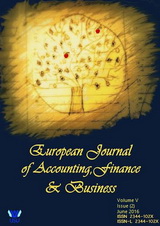|

ISSN: 2344 - 102X
ISSN-L: 2344 - 102X
Our journal is currently indexed in the following databases:
|
| |
Article from Volume 4, Number 2, Year 2016| IMPLEMENTATION OF IAS 38 IN WEST REGION OF ROMANIA ECONOMIC ENTITIES | 
Download | | Author(s): Alin Emanuel Artene, Aura Emanuela Domil, Moise Domil, Adrian Cosmin Caraiman | | DOI: 10.4316/EJAFB.2016.421 | | Abstract: Romanian economic entities accounting is marked by the process of globalizing of financial markets and the need of information among creditors witch count on the robustness, transparency and comparability of financial reports in order to efficiently allocate available capital. In case of Financial Reporting, national difference prevent efficient of financial resources and in this way increasing the risk and the cost supported by investors.
In this paper we try to emphasize the role of a new and more sustainable accounting and how this community awareness takes into consideration when West Region Economic entities price their business for attracting new investors or convincing creditors? Even dough intangible assets are very important to any company, a great percentage of managers, in the area in which we conducted our study, do not have an adequate understanding of how their brand or trade mark and customer portfolio influence the value of their businesses.
The implementation of International Financial Reporting Standards plays an important role in the revival of the economy trough attracting capital and supporting markets. For obtaining this capital Romanian West-Region economic entities need investors or creditors witch make decisions relying on the information available regarding the companies and the majority of this information is presented in the financial statements.
The most concerning problems that economic entities in the West Region of Romania are facing are the access to finance, which in this times of slow recovery after a great economic and financial crisis represents the greatest threat to their future, not to mention that finding customers is always a challenge especially for small and medium size enterprises.
Romanian economic entities accounting is marked by the process of globalizing of financial markets and the need of information among creditors witch count on the robustness, transparency and comparability of financial reports in order to efficiently allocate available capital. In case of Financial Reporting, national difference prevent efficient of financial resources and in this way increasing the risk and the cost supported by investors. | | Keywords: IFRS, Accounting, IAS 38, SME | References:
1. References: Agriculture In The European Union Statistical And Economic Information 2011 Directorate General For Agriculture And Rural Development.
2. Analiza Socio-economica In Perspectiva Dezvoltarii Rurale 2014-2020 Autoritatea De Management Pentru PNDR
3. Bebbington J., Unerman J., & O’Dwyer B., (2014) Sustainability Accounting And Accountability (2nd Ed.) Abbingdon: Routledge
4. Bebbington, J., & Thomson, I. (2013). Sustainable Development,management And Accounting: Boundary Crossing. Management Accounting Research, 24(4), 277–283.
5. Bebbington J., Larrinaga C., (2014) Accounting And Global Climate Changes Issues In Bebbington J., Unerman J., & O’Dwyer B., (2014) Sustainability Accounting And Accountability (2nd Ed.) Abbingdon: Routledge
6. Bogdan O., Mate? D., The Influence Of Accounting System And Fiscal Policy On Regional Development, Studia Universitatis Vasile Goldis Arad, Fascicola 2, Volum 24, 2014, P. 46-57;
7. Gray, R. (2010). Is Accounting For Sustainability Actually Accounting For Sustainability And How Would We Know? An Exploration Of Narratives Of Organisations And The Planet. Accounting, Organizations And Society, 35(1), 47–62.
8. Hopwood, A. G. (2009). Accounting And The Environment. Accounting, Organizations And Society, 34(3–4), 433–439.
9. INS, Anuarul Statistic 2012, Domeniul Agricultur? ?i Silvicultur?
10. Malsch, B. (2013). Politicizing The Experience Of The Accounting Industry In The Realm Of Corporate Social Responsibility. Accounting, Organizations & Society, 38(2), 149–168.
11. Mate?, D., Mo?, I., Domil, A., Conceptual Approaches Concerning Government Grants (Romanian Case Study). 15 (3), 2013, P.29;
12. Mirza A., Holt G. (2011). Practical Implementation Guide And Workbook For IFRS Third Edition Willez Ed. London 2011
13. Moraru, M.,Grosu, V., Bostan, I.,Comparative Study Regarding Financial Statements Of Small And Medium Enterprises In Romania And Germany, Annals.Economic Science Series. Timi?oara, Vol.XX, 2014, P.244-252
14. Owen, D. (2008). Chronicles Of Wasted Time?: A Personal Reflection On The Current State Of, And Future Prospects For, Social And Environmental Accounting Research. Accounting, Auditing And Accountability Journal, 21(2), 240–267.
15. Raport Anual De Progrese Privind Implementarea Programului Na?ional De Dezvoltare Rural? în România în Anul 2011, MADR, 2012
16. Thomson, I. (2014). Mapping The Terrain Of Sustainability And Accounting For Sustainability. In J. Bebbington, J. Unerman, & B. O’dwyer (Eds.), Sustainability Accounting And Accountability (2nd Ed., Pp. 15–29). Abbingdon: Routledge.
17. Http://epp.eurostat.ec.europa.eu/statistics_explained/index.php/Agricultural_output,_price _indi Ces_and_income
|
| | Back to journal ... |
|
|
| |
|
|
|

